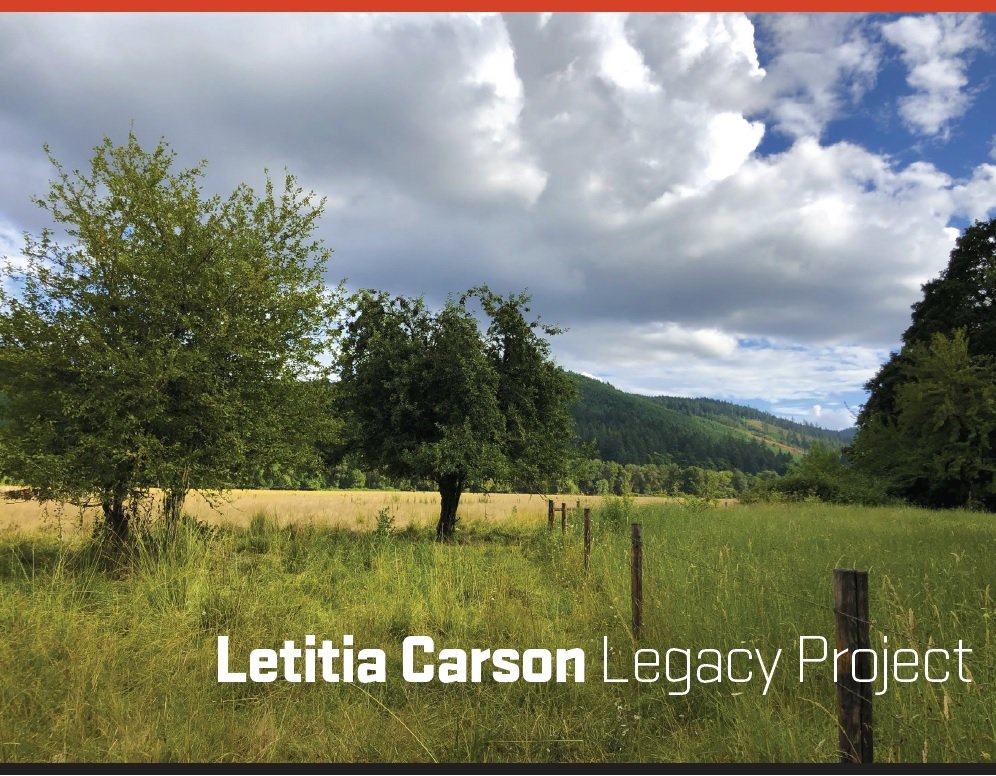The word is out: Oregon Black Pioneers has joined Oregon State University, Black Oregon Land Trust, and the Linn-Benton NAACP to form the Letitia Carson Legacy Project! The Letitia Carson Legacy Project (LCLP) has been happening in the background for more than a year, but was finally introduced at last month’s Oregon Heritage Conference. LCLP seeks to preserve, interpret, and activate a plot of land Benton County’s Soap Creek Valley which was once home to Letitia Carson.
Who was Letitia Carson?
Letitia was a formerly enslaved Black woman from Kentucky, who migrated to Oregon from Missouri in May 1845 along with a white man named David Carson. While we do not know the exact nature of their relationship, the couple had two children together –Martha and Adam. In December 1845, David filed a land claim for 640 acres, the amount entitled to married couples, though officials later reduced this amount to 320 acres because Black Americans were not eligible to file land claims in Oregon.
In September 1852, David Carson died without a will, and a neighbor, Greenberry Smith, was named administrator of David’s estate. Smith did not recognize Letitia or her children as David’s rightful heirs, either because she was Black or because he considered her still enslaved. In January 1853, Smith sold the land and all of Letitia and David’s possessions. Letitia had to spend $104.87 of her own money to buy back some of her own property, which was only enough to recover her bedding, cookware, and a few head of cattle.
However, Letitia had come to Oregon between the Territory’s 1844 and 1849 exclusion laws, which entitled her to certain rights which Black people would not have had just a few years after she arrived. This included the right to bring a lawsuit against a white defendant. In two separate suits, Letitia sued Greenberry Smith for the unlawful sale of her property and for compensation from David’s estate. Incredibly, she won, and was awarded damages of $1500 and over $500 in court fees.
Despite these victories, Letitia and her children never recovered the Benton County lands which were taken from them in 1852.
What is the significance of this land?
Letitia and David’s original Soap Creek Valley homestead has never been developed. It is today part of the Oregon State University College of Agriculture’s beef ranch. Cattle graze on the lands just as they did more than 170 years ago when Letitia tended to cows here.
As far as we can tell, there are no historic sites in the west dedicated to interpreting the life of a rural Black woman. The Letitia Carson Legacy Project is a chance to change that, and with it, create new opportunities to explore the concepts of home, freedom, and justice. While Letitia lived just seven years in the Soap Creek Valley with David Carson and their children, the site of her original Oregon home represents a unique preservation and interpretation opportunity. The Carson lands are one of the few intact spaces in Oregon where people can connect with 19th century Black history in the place where it happened. By honoring Letitia at the site where she once lived, we can experience the power of place and stand shoulder to shoulder with our ancestors.
What does the LCLP plan to do?
We envision creating, on Letitia Carson’s land, a 21st century version of her Soap Creek homestead to inspire, educate, and nurture Oregon’s future generations of Black and Indigenous growers, gatherers, foragers, entrepreneurs, and leaders. On this land, we can learn and practice restorative, regenerative agriculture and land stewardship necessary for resilience in a rapidly changing environment. We imagine experiential learning and applied research opportunities for OSU students and faculty. We imagine welcoming kids, families, and community members to the land to learn and share Letitia’s inspiring story.
Black Oregon Land Trust works to support Black farmers in Oregon by acquiring land for Black farmers to steward in perpetuity, and connecting those farmers with training, technical assistance, equipment and infrastructure, and operating capital. The Letitia Carson lands can provide a space for education and training in entrepreneurial farming. This knowledge is built upon traditions of Oregon’s Indigenous peoples, who have stewarded these lands for thousands of years.
Oregon Black Pioneers envisions onsite education through living history and heritage skills instruction, public archaeology, and environmental learning. In the future, we look forward to exploring more permanent year round interpretive experiences that inform the public about the unique life of Letitia Carson, as well Oregon’s 19th century Black exclusion laws, Black Americans’ agricultural and animal husbandry traditions, and the interconnected experiences of Black and Indigenous peoples.
—
We are excited to share more information about this powerful project as they emerge. Later this year, the four partners will debut several new opportunities for the public to connect more with the Carson lands and the story of Letitia Carson. These will include a digital history repository on what we know of Letitia’s life and her legal battles, and a traveling exhibition which will describe her life in detail –including her many years in Douglas County. And we will offer select events on the Carson homestead where people can gather together outside.
To learn more, please visit the OSU webpage for the LCLP here!
***
Oregon Black Pioneers is an educational non-profit based in Salem. Since 1993, OBP has used research, exhibitions, and public programs to tell the seldom-told stories of people of African descent in Oregon. OBP’s vision is to be the premier source for information about Oregon’s African American heritage. For more information please visit oregonblackpioneers.org.

